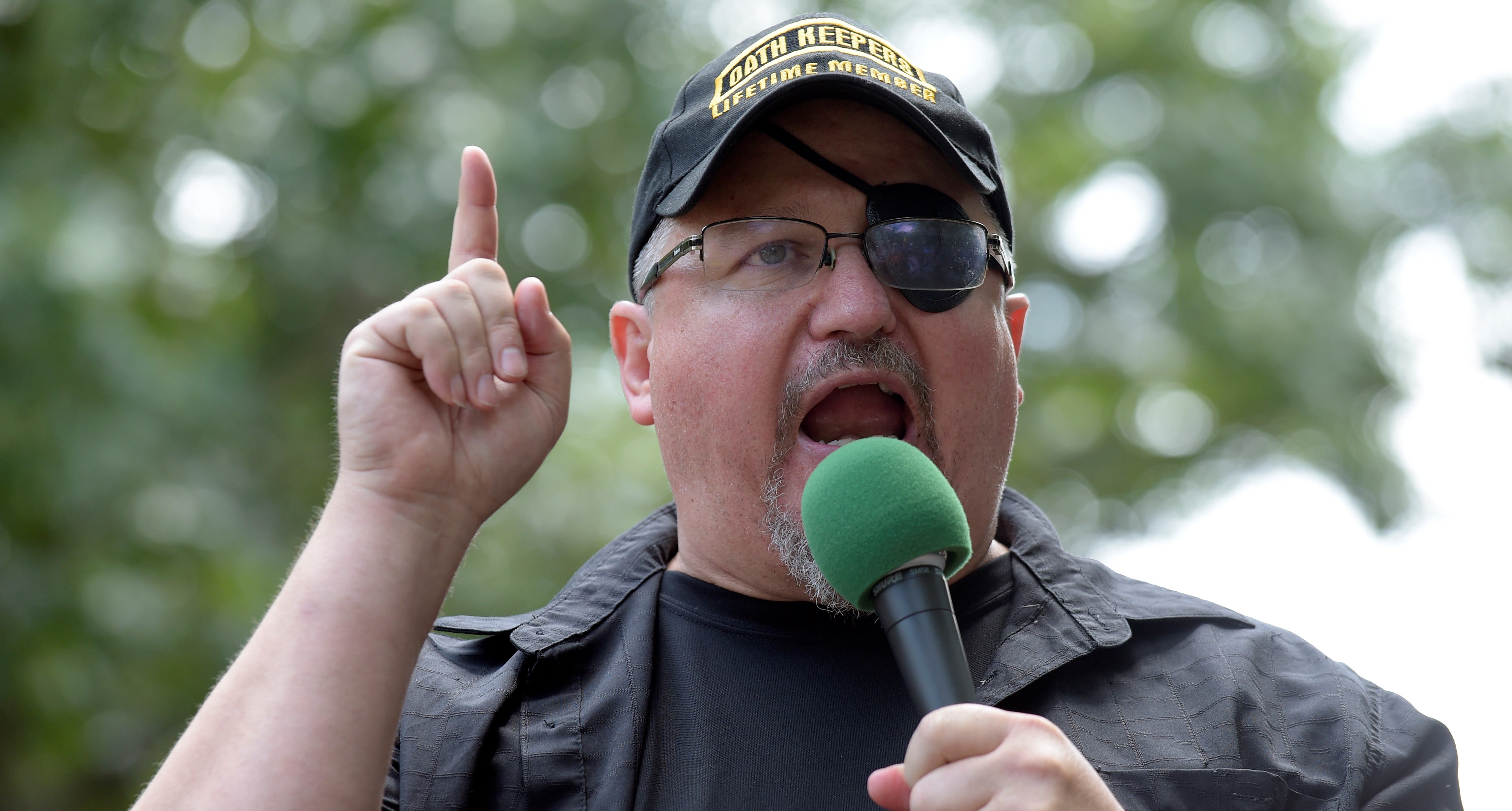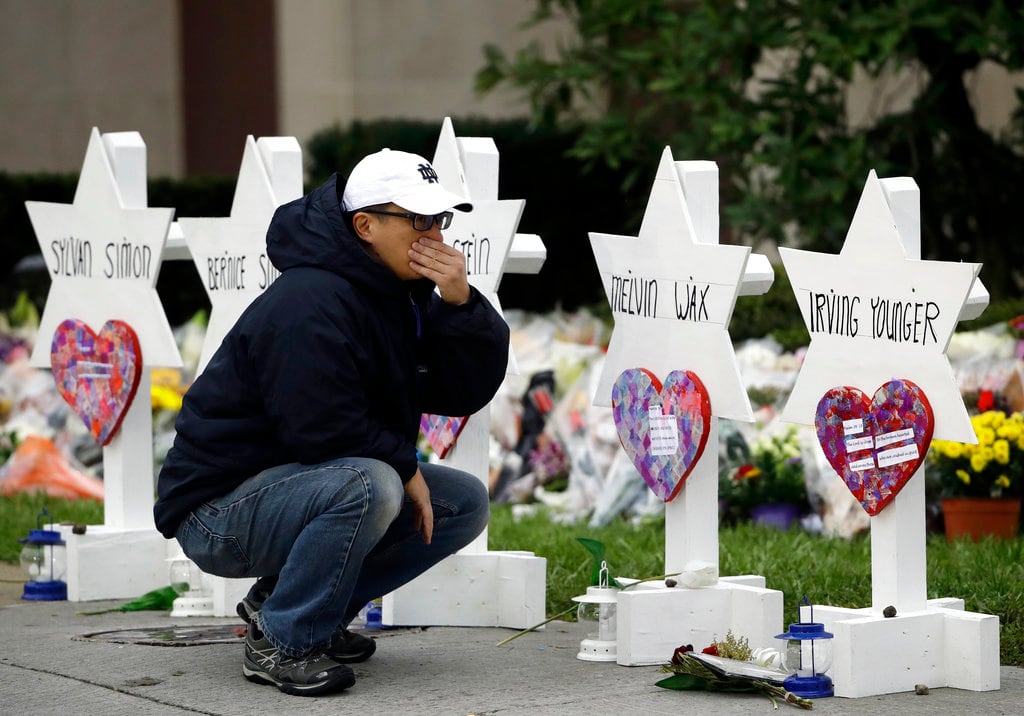A federal judge Thursday sentenced Army veteran and Oath Keepers founder Stewart Rhodes the toughest sentence yet following the Jan. 6 U.S. Capitol riot: 18 years in prison on charges of seditious conspiracy for his role in plotting the attack. His deputy, Kelly Meggs, got 12 years.
The sentence was the longest in the more than 1,000 Capitol riot cases so far, sending a clear message that those who took part in storming the U.S. Capitol, aiming to overturn the 2020 presidential election results, will be held accountable for the deadly violence unleashed that day. The steep sentences clash with the narrative spun by some in the GOP aiming to portray the melee as peaceful protest.
Rhodes’ federal sentencing follows similar tough sentences for the neo-Nazi Proud Boys, but is likely to have even wider impact.
“For the past 12 plus years he has played an outsized role with the militia movement and other similar anti-government extremists,” said Mark Pitcavage, a senior research fellow at the Anti-Defamation League’s Center on Extremism.
Prosecutors had asked District Judge Amit Mehta to sentence Rhodes for 25 years, based on his leadership role, as well as invoke a provision that allows courts to hand out harsher sentences for terrorism. But the Rhodes’ defense countered that he’d served in the military, the Associated Press reported, and was honorably separated from the Army after serving two years and seven months on active duty.
“Eighteen years is still a very substantial sentence,” Pitcavage said. “It’s the longest Capitol storming sentence to date.”
Out of the around 500 people sentenced for charges related to storming the Capitol, the next longest sentence belongs to Peter Schwarz, who will serve 14 years behind prison bars.
Immediately after Mehta handed down Rhodes’ sentence Thursday, he sentenced Kelly Meggs, the leader of the Oath Keepers’ Florida chapter, to 12 years – the third-longest sentence for a Capitol rioter. According to court documents, Meggs had discussed planning an alliance with another extremist group, the neo-Nazi Proud Boys, ahead of the Capitol riot.

Ringleader Rhodes
Rhodes, 58, started the Oath Keepers, an anti‐government, right‐wing fringe group, in 2009, at a time when militia groups made a resurgence after the election of Democratic President Barack Obama. The militia groups grew by the hundreds and Rhodes’ stuck out as a clear influencer targeting military members, veterans, firefighters and police in its recruitment efforts, Pitcavage said.
Rhodes’ was among the most high profile cases to come out of the Capitol riot, during which supporters of former President Donald Trump stormed the building in an attempt to stop Congress from certifying the 2020 election results.
Rhodes’ lawyers argued the Oath Keepers made no explicit plan to storm the Capitol and stop President Joe Biden’s victory. However, prosecutors presented evidence of Rhodes sending encrypted messages to his membership following the 2020 election, telling them to refuse to accept the election result and saying, “We aren’t getting through this without a civil war… prepare your mind, body, spirit.”
During a call with members a few days later, Rhodes outlined a plan to stop the transfer of presidential power, which included preparations for the use of force, according to the indictment.
Of the 180 individuals with military backgrounds who were charged with participating in the Capitol riot, 21 were members of the Oath Keepers, according to data from the National Consortium for the Study of Terrorism and Responses to Terrorism, known as START. A total of 30 Oath Keepers were present at the Capitol that day, the Department of Justice said.
Along with Rhodes and Meggs, four other members of the Oath Keepers were found guilty of seditious conspiracy in the attack, including Joseph Hackett, Roberto Minuta, David Moerschel and Edward Vallejo. Members Jessica Watkins, Kenneth Harrelson, and Thomas Caldwell were convicted of other felony charges related to the attack, but they were acquitted of seditious conspiracy.
The arrest of Rhodes and Meggs effectively shuttered the group, said Michael Jensen, a senior researcher at START, which tracks the criminal activity of extremist groups. The Oath Keepers operated through a hierarchy, which made it difficult for members to continue after the arrest of their leaders.
“Putting the leadership in jail has crippled that organization. It’s defunct at this point,” Jensen said. “The structure was organized under the central leadership or Rhodes. When he and his lieutenants were put away, the whole thing crumbled.”
The group recruited veterans by appealing to their oaths to defend the U.S. Constitution, the ADL said in a 2015 report. The Oath Keepers told veterans that conspirators were taking over the government and asked them to pledge to disobey unconstitutional orders, referring to a conspiracy theory about the government confiscating Americans’ guns. The group stoked paranoia and fanned anti-government sentiments to give its members purpose, the ADL said.
A 2022 leak of an Oath Keepers membership database revealed the names of hundreds of current and former military personnel, elected officials and police. In total, 117 troops serving in the military, 11 serving in the reserves and another 31 military contractors and affiliated civilians were identified.
Members of the group often acted as vigilantes. The Oath Keepers formed their own armed patrol during protests in Ferguson, Mo., in 2014, following the death of 18-year-old Michael Brown, and they patrolled the site of the deadly “Unite the Right” rally in Charlottesville, Va., in 2017, according to the Southern Poverty Law Center. Some members showed up with firearms to polling locations in 2016 and 2022, allegedly to discourage voter fraud. They also offered security to business owners who defied COVID-19 safety measures.
Earlier this month, four members of the Proud Boys, three of whom with military backgrounds, were also convicted of seditious conspiracy in the Capitol riot. Thursday’s sentencing of Rhodes and Meggs could signal how much time prosecutors will seek in those cases. Former Proud Boys leader Enrique Tarrio, along with members Ethan Nordean, Joseph Biggs and Zachary Rehl, are scheduled to be sentenced in August and September.

Domestic Terrorism?
Thomas O’Connor, a member of The Soufan Group, said in the future, domestic terrorism may be the best way to charge people like Rhodes and Meggs, if only such a charge existed.
“After many of these incidents, they come out and say this is an act of domestic terrorism. But in all reality, there is no penalty for the actual charge of domestic terrorism.” O’Connor said federal prosecutors needed to find other criminal violations for the actions he said fall under the definition of domestic terrorism.
In other cases where the prosecution may not prove seditious conspiracy, O’Connor said a charge of domestic terrorism may accurately capture the intent of some crimes, like the Tree of Life shooting at a synagogue in Pittsburgh or the Charleston black church shooting.
“In the Dylan Roof case, he was charged with very serious crimes of homicide and hate crimes federally,” O’Connor said. “But because they’re domestic terrorists, we can’t charge someone and actually identify them as a terrorist because there’s no ability to do so.”
Prosecutors argued that groups like the Oath Keepers and Proud Boys, far-right anti-government groups, rushed to the Capitol to prevent a federal process from taking place in a deliberate effort to prevent transitioning the presidential office and duties from former president Donald Trump to current president Joe Biden.
Mia Bloom, an expert on extremist radicalism, said the lengthy sentences indicate that the judicial system takes domestic terrorism seriously.
With nearly 1 in 5 of Capitol rioters charged as veterans or active-duty service members in the military, Bloom said the issue of military extremism remains a pertinent issue despite recent efforts to downplay its prevalence among the Department of Defense.
Bloom called a recent study issued by RAND misleading, adding fuel to the fire of conservative efforts to remove military extremism from DOD line of sight. The study found that military members were as likely to harbor extreme beliefs as the rest of the American public, although the study authors noted their survey required veterans to self-identify as extremist.
“We didn’t have a pro-Jihad group in Congress after 9-11 but we have a section of Congress that refuses to consider right-wing terrorism is terrorism,” Bloom said.
This story was produced in partnership with Military Veterans in Journalism. Please send tips to MVJ-Tips@militarytimes.com.
Allison Erickson is a journalist and U.S. Army Veteran. She covered military and veterans' affairs as the 2022 Military Veterans in Journalism fellow with The Texas Tribune and continues to cover the military community. She has written and reported on topics such as migration, politics, and health.
Nikki Wentling is a senior editor at Military Times. She's reported on veterans and military communities for nearly a decade and has also covered technology, politics, health care and crime. Her work has earned multiple honors from the National Coalition for Homeless Veterans, the Arkansas Associated Press Managing Editors and others.









